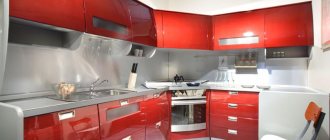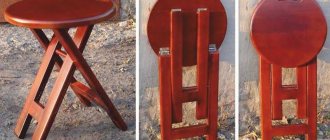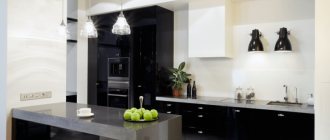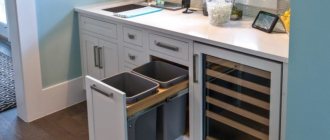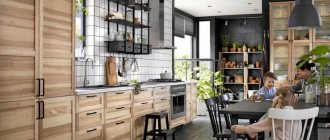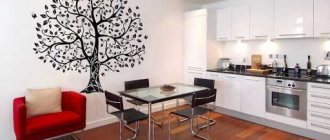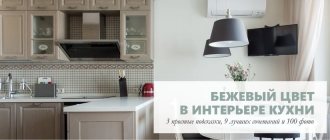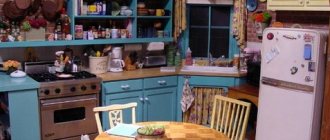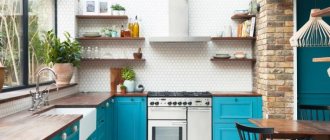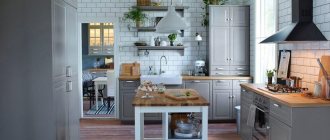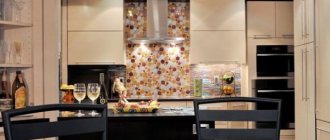When equipping your kitchen with a hood over the stove, you need to decide on the type of this equipment. Inclined models are considered the most technologically advanced and compact. They are distinguished by a stylish appearance, improved functionality and increased power.
The inclined hood, made of metal, has a clear geometric shape and will look great in kitchen spaces of different styles.
The choice of a specific model depends on the size of the room, the wishes of the owner and a set of additional functions. When viewing models, it is worth getting advice from a specialist who will help you choose the type of air exhaust, the type of hood, and its functionality. You can determine the dimensions and calculate the power yourself.
An inclined hood is capable of fully ventilating a room of any size with minimal loss of usable space
Differences between an inclined hood and a traditional one
An inclined hood can be easily identified by its appearance. It looks like a maximally functional plane inclined at an acute angle to the wall with air intake openings. The rest of the mechanism is almost entirely elegantly hidden behind the bezel and does not attract attention.
Compared to a traditional dome hood, an inclined one has a number of advantages and disadvantages.
A dome hood has its own advantages, but it is larger than an inclined one. Traditional designs require more space. It has higher power consumption and noise levels. However, such hoods are also in demand in a number of cases. Inclined hoods are convenient for equipping city apartments, private houses, kitchens used for internal office needs.
In loft or studio apartments, an inclined hood is not only convenient, but also optimally matches the style of the room.
A dome hood has its own advantages, but it is larger than an inclined one. Traditional designs require more space. It has higher power consumption and noise levels. However, such hoods are also in demand in a number of cases. Inclined hoods are convenient for equipping city apartments, private houses, kitchens used for internal office needs.
In loft or studio apartments, an inclined hood is not only convenient, but also optimally matches the style of the room.
Great productivity
The air intakes of the inclined hood are located at such an angle to the cooking surface of the stove that the air naturally reaches the catchers. In this case, the air flow is not split into separate jets and does not require increased motor power. It is convenient that modern hoods use more technologically advanced motors, characterized by increased power and performance.
During operation, the hood does not overload the energy system of the house, since modern motors have low energy consumption. Thus, an inclined hood not only cleans the air efficiently, but also helps save on electricity bills.
Low noise level
Powerful inclined hood motors are structurally more advanced and are characterized by a low noise level during operation. At the same time, the design of the hood allows you to capture air from the stove due to natural reasons. This does not require turning on the motor at full power, which also helps reduce noise levels.
With a European standard of 60 DHz, inclined hoods show an operating noise level of within 45 DHz - this is very good for equipment operating like a fan.
High ergonomics
An inclined kitchen hood takes up little space, while allowing the use of additional equipment (for example, lamps). It has increased ergonomics with modest size and wide functionality. Significant advantages in use are created by the presence of advanced control functions.
They allow you to start the hood in automatic mode, adjust its parameters, and use additional equipment.
Convenient control panel
The vast majority of high-tech inclined hoods are equipped with remote control. It is duplicated by buttons or a touch panel on the device body. The display broadcasts the current settings and load indicators of the hood, as well as information about the condition of the filters and the need to replace them.
The hood can be set to specific on and off times. To activate the operating mode, you don’t even have to enter the kitchen - either the remote control or the timer will work.
Remote control will make it easier to use this hood model. You can activate the hood when the temperature in the kitchen rises or by air analysis. If it is dirty, the equipment starts working.
Attractive design
Inclined hoods are presented in a wide range from classic design options to high-tech, modern, and minimalist styles. The front panel can be made of metal, ceramics, tempered glass of any color.
They do not fade over time and are easy to clean. Such a panel should not be cleaned with hard metal brushes - they will scratch it. Otherwise, the hoods are resistant to scratches and minor mechanical damage.
How to hide a hood?
If you purchased the wrong model or changed the interior after installing the hood, you can hide it in a box. The advantage of this method is that there will be space above it for storing kitchen utensils.
An unusual but effective option is mirror film. Thanks to the visual illusion, everything unnecessary literally dissolves into space.
The photo shows the hood hidden in the box
However, most often it is not the exhaust system itself that needs to be closed, but the pipe from it. There are 4 main ways to do this:
- Hide in the ceiling. A suspended or suspended ceiling structure allows you to completely hide unsightly communications. But it will have to be placed at a lower level, because standard pipes have a diameter of 10-15 cm.
- Sew it into a box. Decorative boxes are made from chipboard, MDF, wood, metal, and plasterboard. This is a low-complexity job, so you can do it yourself. The disadvantage of this method is the lack of additional functionality.
- Place the closet in the top row. An additional second row of wall cabinets allows you not only to increase the storage area, but also to hide the corrugation leading to the ventilation.
- Decorate in the color of the walls. The method is suitable exclusively for monochromatic finishing. When you repaint the round pipe to match the color of the wall behind it, it will simply disappear.
If you are not bothered by the fact that there is a pipe in the interior and it suits the style of the kitchen (loft, modern, high-tech), leave it as is. Or make an accent on it by painting it in any bright color.
The photo shows the use of an illusion with mirror film
Principle of operation
Inclined hoods are a universal type of equipment characterized by ergonomics and high performance. Such a device operates in accelerated mode and provides rapid cleaning and movement of air.
At the moment, there are several types of designs on sale, they differ in the principle of operation.
Branches.
Remove polluted air from the kitchen completely, replacing it with fresh air. The cleaning process occurs through an air duct connected to the central ventilation shafts. In this case, a check valve must be installed at the outlet of the system so that dirty air cannot return back into the room.
Such units are considered the most effective and widespread, but their installation is complex and requires the help of experienced specialists.
Recirculation.
They are placed directly above a gas or electric stove, since the purifiers only recirculate air flows. Such options are most often chosen if there is no possibility of installing air ducts in the kitchen. Hoods work very simply - all fumes from cooked food are sent to a special filtration system, are cleaned and returned back to the room without odor or grease particles.
Combined.
They are a mixed option. Such models are usually placed at an angle to the wall. The hood can be either telescopic or built-in.
Device
An inclined hood is an improved version of conventional appliances. The difference lies in the location of the working surface, which is placed at an angle.
Due to this, it was possible to increase the productivity and speed of cleaning, since the air flow moves through a narrow passage.
Fan in an inclined hood
The internal structure of a hood with an inclined screen is identical to air purifiers of dome, corner or island types. The device is equipped with a motor that drives a fan, grease and carbon filters.
Depending on the model, the control panel can be push-button or touch-sensitive. Mechanical switches are not used in devices of this type.
The control panel consists of several buttons arranged in one row. With their help, the device turns on, the speed mode is set, and the brightness of the backlight is adjusted.
Most models of beveled hoods have 3 speeds for sucking air from the room. The intensive operating mode is used in emergency situations: when a dish is burnt and you need to quickly remove the smoke that has filled the kitchen.
Grease filter
The grease filter is a multi-row mesh made of stainless steel or aluminum. The element is easily removable and should be washed regularly in the dishwasher or by hand using mild cleaning agents. The filter is designed to capture grease particles from the air and protect the engine.
The hood is placed directly above the stove. The selection of a device for performance is carried out according to calculations based on the volume of the kitchen, as for vertical air purifiers.
According to sanitary standards, about 10-12 m3/hour should be removed from the room. In a kitchen with an area of 15 square meters and a ceiling height of 3.2 m, a hood with a capacity of at least 700 m3/hour should operate, taking into account a reserve of 20%.
Advantages of inclined models
Wall-hung and dome hoods in kitchen interiors are a common and practical option with one significant drawback - their dimensions. Such devices require a lot of space, which is why they have to be abandoned in limited space.
The main advantages of such hoods include the following points.
- High power. Thanks to the optimal dimensions of the air intake and intensive suction of vapors, air purification is carried out instantly, without requiring additional energy consumption.
- Easy to use. As a rule, inclined units are produced with remote control, which makes it possible to easily turn the equipment on and off and switch its operating modes. In addition, the remote control can be controlled at a distance from the hood, which is very convenient. This function has received positive reviews, since in the kitchen you can perform several tasks at the same time without interrupting the work process.
- Quick installation. The design of the equipment is simple and anyone can assemble it without much difficulty.
- Multifunctionality. The combination of high technology and compactness make it possible to install such hoods in rooms of various sizes, which is especially important for small kitchens, where every centimeter of space counts. In addition to air purification, the device also does an excellent job of ventilating the room and has a set operating time. Many models have auto-on and a delayed start function.
In addition, the equipment is additionally equipped with built-in humidity detectors and begins air purification immediately when the hob is turned on, independently adjusting the lighting level.
- Easy care. The degree of filter contamination is shown by a special indicator that creates signals in the form of a flashing light. To clean the equipment, just wipe it with detergents and replace the filter.
As for the shortcomings, there are few of them. Some inclined hoods are manufactured with a motor that is too powerful, the operation of which can cause excessive energy consumption. The cost of corner models is quite high.
Air purification methods
The first category consists of products that operate from exhaust: the equipment does not process the air, but only replaces it with fresh air coming directly from the ventilation duct. During the installation process, it is imperative to use an air duct; it may require additional usable space in the room. Despite the relative inconvenience of installation, this particular option for introducing inclined hoods is the most common.
Reasons: a wide selection of designs and colors (black is in demand due to its practicality, white and beige are attractive for their versatility), optimal power of equipment, availability of budget prices.
The second group includes recirculation type devices. They process the air in several stages. At the first stage, external cleaning is carried out: fatty inclusions are removed using special filters. In the second stage, the carbon components of the system are involved: complex air purification is carried out here, and unpleasant odors are eliminated.
The choice of the second option is attractive for those users whose kitchen is not subject to sufficient natural ventilation or does not have access to a ventilation duct.
The top of the user rating is headed by mixed technologies that combine the operating principles of both options, which significantly increases their productivity. The downside is the high cost of such products.
Factors influencing pricing
Ratings of popular models of inclined hoods include such indicators as the cost of equipment, its design, performance level, and service life. In particular, compact models with a width of 50 cm are the most affordable and, accordingly, desirable; 60 cm variations are a little more expensive. Larger products with a width of 80-90 cm require significant costs, including installation.
Gray inclined hood
When choosing models, professionals recommend turning, first of all, to the products of global concerns, since they have the optimal price/quality ratio. The specialized market offers a wide range of equipment from both the budget and premium segments, and this division allows you to purchase the optimal model in accordance with your financial and spatial capabilities.
Inclined hood with protective panel for the stove
Modern kitchen hoods are not only a convenient tool for purifying the air from odors, impurities and steam, they become stylish accents in the interior. Thanks to the inclined model, the room will be fresh and clean, and the unusual design will allow you to turn any design ideas into reality.
Beige inclined hood
Sloping glass hood
Specifics of installation of inclined hoods
When deciding at what height to hang the hood, we must not forget that the equipment should not interfere with the normal use of the cabinets, especially if built-in appliances are hidden in them. If the hob is compact, a model with a width of 50 cm or more will be sufficient to service it.
In rooms that are regularly heavily polluted and require comprehensive air purification, devices with powerful motors are installed, and here the design is not as important as the functionality of the equipment.
In such conditions, wall-mounted kitchen furniture is usually used, then a large hood (with a width of 80 cm) will not interfere. Moreover, the furniture parameters are usually adjusted to the dimensions of the cleaning equipment.
Installation of inclined models is carried out in the standard mode; it is no more difficult than installing conventional options. Autonomous products that are not connected to the air vent are fixed with screws and dowels; they only need access to power. If it is necessary to introduce equipment with air exhaust into the interior, you will need to install a ventilation pipe.
When calculating the trajectory of its laying, productivity losses in the presence of turns are taken into account. At the end of the work, the craftsmen carefully seal all connections.
To fully unlock the potential of the equipment and ensure safe operation, it is necessary to maintain the distance to the exhaust module recommended by the manufacturer. If a gas stove is used, the minimum value is 60 cm, if an electric one is 50 cm. In some cases, users tend to hang the device from the ceiling, and here it is important to check the reliability of the fastenings and the quality of the fixing elements.
During operation of the inclined hood, vibrations of the ventilation pipe cannot be excluded, and therefore it is necessary to leave a significant gap between it and the lower border of the ceiling trim.
How to choose an inclined hood for your kitchen interior, photo
The main parameter when choosing a kitchen hood is the power of the equipment. The power of the equipment is calculated based on the volume of the room in which it will be installed.
The calculation formula is simple: determine the volume of the room (width x length x height m3), multiply by 12, then by 1.3.
Calculation of the performance of exhaust equipment based on the cubic capacity of the kitchen
The first coefficient means that the air must be completely changed at least 12 times per hour when the stove is running. The second coefficient corresponds to the ratio of the required effort to pump air in the ventilation duct with the volume of the kitchen. It applies only to multi-storey buildings.
Recommendations for productivity depending on the size of the family and the amount of cooking
When the technical parameters of the hood are determined, the subtleties of choosing the optimal model depend on the overall design of the room and the desired functionality. When installing an air duct system, you need a hood with a larger decorative casing, behind which the pipes are hidden. It is necessary to take into account the height of the ceilings in the room. When placed correctly, this device becomes a real decoration of the interior.
An inclined hood with a curved hemispherical shape will add a geometric accent to a modern kitchen design.
Inclined hood in the kitchen interior, photo
The hood can be made in neutral colors or have a painted front side.
The red hood is suitable for kitchens where the classic combination of black and red is used
The control display also turns into a design element in some models and differs in color and design from the main panel. To clean the hood, use only products recommended by the manufacturer. With careful handling, it will last much longer than the warranty period.
Installing an inclined hood will be appropriate in any stylistic decisions
Types of models and sizes
The model range of this product is very wide. You can choose an inclined hood to suit every taste and budget. There are three types of inclined hoods, differing in their method of operation.
The hood, taking air from the kitchen, simply removes it through the ventilation, thereby freeing up space for an influx of fresh air.
- Conventional horizontal hoods also work on this principle. This type of cleaning is the most effective, although it requires working ventilation with the appropriate flow capacity for a given hood, otherwise the air absorbed by the device will go through the ventilation to other rooms.
- Hood operating under recirculation conditions. Taking in air, it passes it through a series of filters and releases it back purified. This hood is advantageous in that it does not require a connection to ventilation. That is, firstly, there will be no air duct, and secondly, there is no need to have a working ventilation system nearby. This type of inclined hoods will perfectly cope with the tasks assigned to it, provided that the filters are replaced in a timely manner.
- Mixed type. You program this type of hood yourself, depending on what working conditions you need. This is especially true when performing various tasks in the kitchen, because the power of air purification varies, whether you fry cutlets or steam vegetables.
- Inclined hoods are also available in different sizes. And your choice should be based on the volume of the kitchen, as well as the equipment and design.
- Small 55 cm hoods are suitable for compact two-burner hobs.
- For a standard kitchen in panel houses, where the stove size is usually 60 cm and the hood should be selected in the same size.
In rooms where food is cooked for a long time and a lot, a model with a powerful motor is needed, capable of driving through as much air as possible. In such rooms it is recommended to install an inclined hood with an increased size from 70 cm to 80 cm.
The variety of colors is also great. There are standard white, beige, silver hoods, and deep red.
You can find or order devices in other colors or with ornaments. But still, the most popular color today for inclined hoods is and remains black. In this color scheme, this device is similar to an LCD TV screen. It easily fits into the interior of any kitchen.
In addition, some models of inclined hoods change the angle of inclination of the working edge, which allows you to move it to an almost vertical position.
The materials from which inclined hoods are made are also varied, but the most popular are glass. They look great and are easy to care for.
Criterias of choice
There are several points to consider when choosing an inclined hood:
- When allocating space on the wall, you need to remember the width of the hanging cabinets that will be located next to the device. The device should be approximately the same width as them, and not be installed flush against the side walls of the furniture. It is sized to fit the hob. The average width of the stove is 50 cm, the width of the hood is 55 cm.
The width of the device and the width of the plate are approximately the same
- For compact two-burner hobs, small hoods are used. Models with unusual shapes, such as round ones, look good.
Compact model for 3 burners
- The power of the device depends on the fans. Some models are equipped with two fans; they will work more efficiently, but the noise level will double.
- Preference is given to devices with touch controls and an additional remote control. Mechanical buttons do not look as good as the sensor and collect dirt.
Important! If an inclined hood is installed in a kitchen where people cook frequently and the air gets polluted quickly, its power should not be less than 200 W. Otherwise, the cleaning will be performed poorly. Large models are used - from 80 cm. Furniture and equipment are chosen according to its size.
Operating principle and installation
As we have already said, there are three operating principles for inclined hoods:
- air exhaust;
- air cleaning;
- mixed option.
Its installation depends on what type of electric hood you have. In any case, it will not be more difficult than installing a traditional horizontal hood, and in some cases it will be easier. To install the first and third types of inclined hoods, you need to connect them to the ventilation system of your home.
But let's look at everything in order:
- We mount an inclined hood on the wall. This is done using a drill and dowels. For fire safety reasons, it is allowed to install the hood at a height of 60 cm from the hob if the stove is gas, and 50 cm if it is electric.
- We equip the air outlet to the ventilation using an air duct pipe, taking into account that each bend in it reduces the performance of the hood by 10%, so the best option is to connect the device directly to the ventilation without bends or long shafts.
- When installing an inclined hood, it is worth taking into account the fact that during its operation the ventilation pipe vibrates, so it is necessary to provide a small space between the air duct and the ceiling frame to avoid rubbing of the latter.
- The second point is not useful if you are installing a kitchen hood with an air purification system. The entire process of eliminating dirt and odor in such a device occurs inside the housing, and there is no need to connect to the ventilation system. The only thing this species needs is an electrical outlet.
- Some kitchen designs involve mounting an inclined hood to the ceiling. The design feature allows this. But if you are attaching an inclined hood to the ceiling, check that the installation is secure.
- Everyone who chooses an inclined hood is concerned with the question of whether such a device with an air purification system will cope with the task. According to numerous reviews, an inclined hood, no matter what cleaning system it has, copes with the destruction of dirt and odors no worse than conventional horizontal appliances. But its silent operation puts it a step above ordinary hoods. In addition, the design of inclined hoods is beyond praise.
The only disadvantage of this type of device is its high price. But even here you can find models that are not so expensive.
The Krona company has long established itself in the kitchen appliances market. At the moment, it is also engaged in the production of inclined hoods. The price of the product needed by this company is very affordable and is suitable even for a small budget, and the model range is extensive, and almost everyone will find in it the hood they dreamed of.
Material and color in kitchen design
Designer kitchen hoods have a decorative look and perfectly complement the furniture range. Durable and heat-resistant materials are used to make the housing and ventilation unit.
Design additions are more varied. The facade materials are stainless steel (often in combination with glass), glass, ceramics, enamel, wood, flooring.
It’s easier to choose a model in white, gray (silver), black, or beige. Less common are brown, red, and cream shades. The probability of finding a floor hood of a different (for example, light green) color and a card of a suitable size is close to zero.
The main component of a comfortable design is color. A variety of shades allows you to choose the unit to suit any interior style, from classic to modern. The new inclined hood is a noticeable middle detail and cannot be disguised.
It should have a stylish look, so it is often recommended to choose it not in tone, but in contrast.
For example, a red or black hood installed in the kitchen interior can become an accent detail if light shades are chosen for the decoration and furniture. The same applies to the opposite situation. The center of the composition can be a white hood in an interior decorated in a dark palette.
Briefly about the main thing
The inclined hood, unlike traditional models, is compact and therefore suitable for installation even in small kitchen spaces. Modern models are equipped with high power, and their noise level is significantly reduced, and does not irritate the rights of people in the kitchen.
Inclined-type models differ in their active operating principles, the type of filter installed and the number of fans.
Cabinet units are varied in material, shape and color, which allows them to be integrated into any interior style and project. Usually they are not sought to be hidden from view, but rather made into a significant design element.
Advantages
Before choosing an inclined model, you should familiarize yourself with its advantages:
- Economical in terms of free space in the kitchen. The design of the model will add lightness and sophistication to the interior;
- Installation does not require a lot of time and physical effort;
- Improving control modes makes devices convenient due to the choice of control method and the presence of speed switches;
- The newest tilting hood is equipped with additional functions, such as a timer, auto-off mode, etc.;
- Combination of high power and low noise level.
Beautiful examples in the interior
The interior of a modern kitchen is presented in various design options, but the main emphasis should be on the design of the hood, since it not only performs a cleaning function, but also serves as a decorative item. Today, an inclined kitchen hood with lighting with a chrome-plated surface imitating natural wood is extremely popular; it is an original addition to the set and allows you to create a unified style of space.
- As a rule, a device with such a finish is often chosen for new ideas for spacious kitchens that feature wood cladding on the walls and ceiling. In this case, it is not necessary to install rectangular hoods; flat and triangular shapes are welcome in modern style.
An excellent solution would be rubrics and volumetric glass devices. Their glossy black or white surface can be easily combined with bright matte colours. To fill the room with homely warmth and comfort, use a beige hood; its panels will not look flashy, and will beautifully highlight the view and shades of the furniture.
In the event that the kitchen area is combined with the living room, or the bedroom is connected to it, the interesting color design is selected in accordance with the shades of not only the site’s household appliances, but also the decorative finishes. Many connoisseurs of classics most often prefer white, black, gray and brown hoods, which you can install with your own hands.
Tips: A white shade fills the kitchen with harmony and visually expands the space.
To prevent the interior from seeming too boring, it is ideal to complement it with yellow, gray and red inserts. For example, a kitchen with a white-yellow or white-brown hood will acquire both style and freshness. There is no need to be afraid to install contacts and inclined hoods in bright colors; they can be additionally decorated with drawings or unusual patterns.
If warmer shades predominate in the kitchen, then it is best to purchase a light brown or beige hood and share your joy with friends. It can easily be combined with the overall decor of the room and will give it charm and elegance, and the nursery and hallway will not allow couples from the kitchen to pass through. To prevent the device from looking “lonely,” it is advisable to decorate its sides with various shelves on which you can place original figurines and vases of flowers.
As for the black inclined hoods, they easily fit any style. They look unusual in rooms where the decoration contains elements with black inserts.
It is also important that the exhaust device matches the shade and other equipment. For example, an unusual solution would be to purchase a black hood, refrigerator and stove; in this case, the kitchen set and wall decoration should contain brighter and lighter notes for each.
Care
The best thing about modern appliances is that they will tell you when they need to be cleaned. This also applies to inclined hoods. Inside them there are special technical sensors that calculate the amount of air passing through the filters before purchase, and report on reaching the minimum permissible value to the corresponding indicator. All you have to do is change the filter.
Cleaning the hood itself will also not cause much trouble. You just need to decide and rub the hood with a rag and remove the grease deposits. Under no circumstances should you use abrasive substances or melamine sponges; textiles are better, since the surface of inclined hoods is most often glossy, you can easily scratch it and the shine of the coating will disappear. Melamine sponges spoil the subtleties of the coating.
A modern inclined hood is not only a high-tech device for purifying the air from dirt and odors, but also an additional accessory in interior design, its location, sophisticated shapes and unsurpassed style will give a harmoniously unique look to your kitchen.
Additional equipment
Modern inclined hoods have become high-tech and multifunctional. They not only purify the air in the kitchen, but also notify you about the condition of the filters and the need to replace them. The convenient panel and its efficiency, combined with the remote control, have the ability to select operating modes and activate delayed start.
Many models have the ability to automatically turn on for the housewife when the air parameters in the room change.
Models with built-in lamps are especially popular. Halogen lamps are most often used, but it is also possible to install more economical LED lamps. Designers say that this is very convenient if you don’t want to make repairs and turn on the overhead lights. In a large kitchen-dining room, this option is very convenient for experts.
The hood control can be either traditional push-button or touch. The most technologically advanced and expensive models are equipped with an anti-return valve. This mechanism prevents overheated dirty air from flowing from the ventilation shaft back into the kitchen when the hood is turned off.
Functional capabilities
A kitchen set with an inclined type hood has an unusual and elegant appearance. This is facilitated by high-quality and economical LED lighting, ergonomic shape, as well as the capabilities of the device. The functionality of the equipment is an important factor when choosing, and various models, in addition to convenient touch control, demonstrate the following capabilities:
- Automation of the start of work: automatic switching on and off, delayed start, timer.
Compact location Source onliner.by
- Special software monitors the condition of the filters and signals the need to replace them.
In a country kitchen Source homevalley.ru
